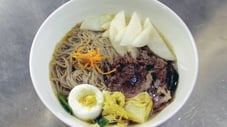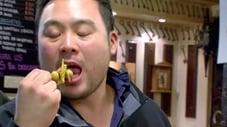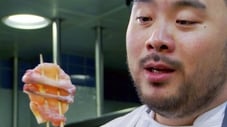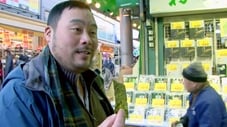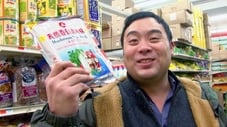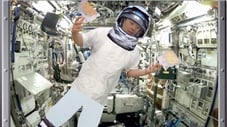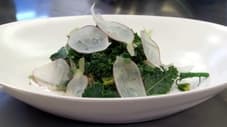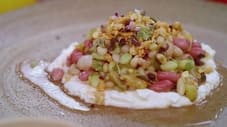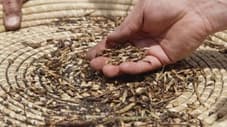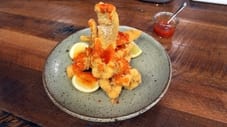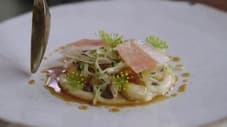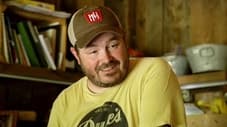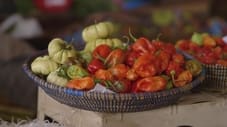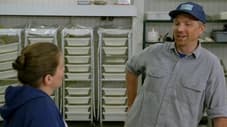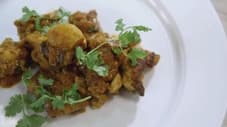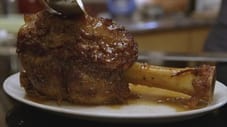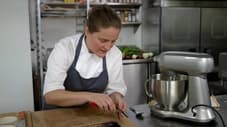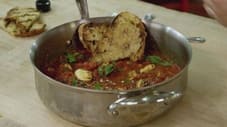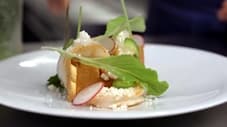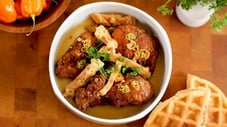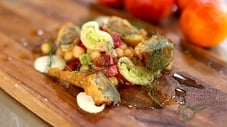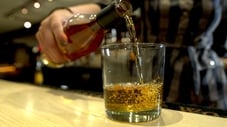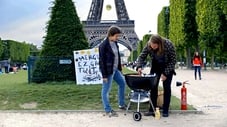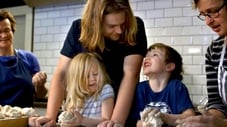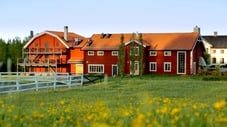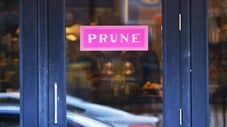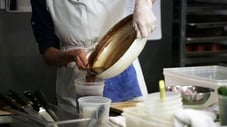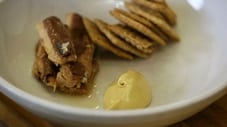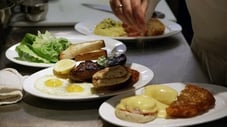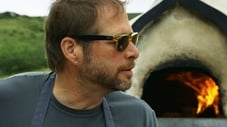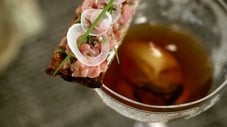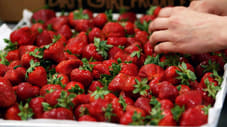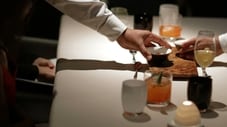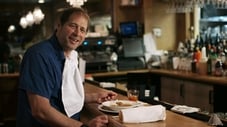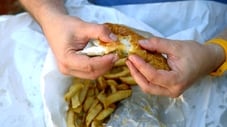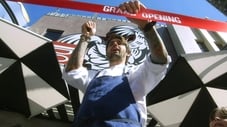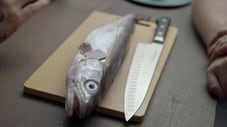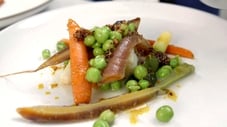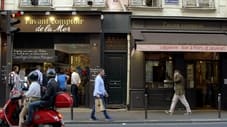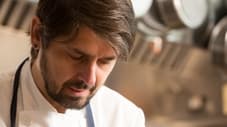
The Mind of a Chef (2012)
← Back to main
Anthony Bourdain as Narrator (voice)
Episodes 86
Surf N Turf
Explore the wet and dry side of our culinary world as Magnus Nilsson dry-ages a steak in kidney fat as long as he possibly can, April Bloomfield hallucinates while at a butcher shop, and Ed Lee makes a ribeye with eel puree.
Read MoreNoodle
Korean-American Author and Chef David Chang visits a noodle factory in Japan, eats the best bowl of ramen in his life, and cooks two incredible dishes with the instant ramen variety. Food Scientist Harold McGee explains how alkaline salts make ramen noodles unique.
Read MoreGluttony
It’s gluttonous goodness in this episode; over the top indulgence with Joe Beef chefs Federic Morin and David McMillian’s fois gras sandwich, a whiskey tasting Mayhem with Chef Sean Brock at Buffalo Trace in Kentucky and the classic dish Hot Brown served up three ways.
Read MoreSweet Spot
Chang’s protégé Christina Tosi makes corn cookies three ways and her three layered Arnold Palmer Cake, Chef Burns makes ice cream and Chang goes strawberry picking.
Read MoreSoutherners
A spotlight on the regional variations of southern cuisine. Chef Steven Satterfield makes okra and grits. Chef John Currence makes tamales. Chef Ed Lee creates a dish using bourbon, sorghum and country ham. Pastry chef Lisa Donavan makes a buttermilk pie. New host Sean Brock is joined by the Lee Brothers to make deviled crab
Read MoreSeeds
It all began when Sean Brock went looking for Jimmy red corn. That simple journey turned into a lifetime of searching, archiving and reviving lost crops of the South. His partners in crime are legendary owner and operator of Anson Mills, Glen Roberts, and University of South Carolina professor David Shields — a trifecta of seed nerds hell-bent on preserving Southern food heritage.
Read MoreLow Country BBQ
Host Sean Brock prepares an outdoor feast on a friend's farm, where he's joined by barbecue pitmaster Rodney Scott, who roasts a whole pig; and Steven Satterfield, who makes Savannah red rice. Brock also prepares frogmore stew
Read MoreBritish Classics
Review some of the signature dishes of UK cuisine: bangers and mash, fish-n-chips, and pies.
Read MoreFarmer
April travels four hours outside London to Cornwall to visit and cook with farmer and chef Tom Adams on his farm. Tom raises the cute, furry and delicious mangalitsa pigs. April and Tom butcher and cook the entire pig piece by piece: loin, shoulder, belly and head.
Read MoreLeftovers
This episode aims to prove that nasty bits have been given a bad rap and deserve to be on the kitchen table along with meatloaf and mashed potatoes. In the kitchen, April cooks faggots, bubble and squeak and pig parts; Fergus Henderson works his offal magic on kidneys.
Read MoreRestauranteur
Chef Bloomfield wrestles with the questions every aspiring new or expanding veteran chef has to confront. April and her business partner, Ken Friedman, explore the challenges of opening their first out-of-state venture in San Francisco: Tosca. April is inspired by a local morning bun, and she’s busy in the kitchen testing and tasting dishes for her new menu.
Read MoreNYC Origin
Ed returns to his roots in East Brooklyn and the eclectic mix of cuisines that inspired how he cooks today.
Read MoreLouisville
Taste the food and culture of Louisville, Kentucky, the place Ed now calls home.
Read MoreImpermanence
The more things change… the more they continue to change. Explore the ephemeral with Ed as he tries his hand at cooking alternative meats.
Read MoreSpring
After a long winter, the arrival of spring awakens the delicate flavors of young herbs. The sun remains perched in the sky until midnight, the temperature climbs, and life returns to the once snow-covered landscape. This episode takes advantage of this brief window of time to explore the ingredients of spring in Sweden.
Read MoreCreation
When Chef Nilsson develops a dish at Fäviken, he pays careful attention to the unique properties of an ingredient. Through research and recipe testing, the components of a dish are combined with the aim of preserving their natural quintessence. “The Creation of a Dish” follows the life cycle of an ingredient as it transforms from an idea into a dish at his restaurant.
Read MoreTraditions
Examine how the bonds of tradition help to forge the identities of families and individuals.
Read MoreDocumentation
Chef Magnus Nilsson's efforts to document and preserve Nordic traditions are detailed including a visit to the Faroe Islands.
Read MoreFäviken
A day in the life of chef Magnus Nilsson as he and the Fäviken staff prepare for dinner. The routine starts early, as Nilsson forages for spruce branches for his scallop dish and ends late, as every detail of the dinner is meticulously choreographed and executed.
Read MoreHunger
From a very young age, Gabrielle Hamilton was left alone in her home to fend for herself. She rummaged through what was left in the pantry and refrigerator and satisfied her hunger with what she could scavenge. At 16, she moved to New York City where she used her jar of change to feed herself. All her experiences with hunger made her the chef she is today.
Read MoreHustle
Surviving the restaurant game for 15 years in New York City takes some major hustle. From lying about her age to get her first dishwasher gig to lying about her tips, getting busted and charged with grand larceny, hustling was the easy part in running a restaurant for Gabrielle Hamilton.
Read MoreStrawberry
A dish is only as good as its ingredients, but an ingredient can also be manipulated in many ways. In this episode, David focuses his attention to the strawberry, at the height of its season during production, to celebrate the summer favorite.
Read MoreRestrictions
Diners these days can be pickier than ever, and they seem to have no problem telling a chef how to do his or her job. Allergies, self-diagnosed sensitivities and customer “dislikes” have become the bane of several chefs’ existence.
Read MoreNew Orleans
When your first restaurant job is Commander’s Palace in New Orleans, you are inevitably destined for great things. As a high school student in New Orleans, David’s eyes were opened by the glamorous Crescent City institution, and a long career in cuisine followed.
Read MoreLudoBird
How does a chef trained in the finest kitchens of France translate his haute cuisine to fast food? Ludo’s obsession with a perfectly cooked bird can be traced back to France, where he learned to roast chicken, and his love for the American classic was solidified when he ate at KFC for the first time.
Read MoreStrip Malls
Trois Mec and Petit Trois can be found side-by-side in a Hollywood strip mall, nestled between a dry cleaners and a Yum Yum donut. Ludo’s restaurants and the dishes he creates for them embody the cultural mash-up and high/low flair that is the strip mall philosophy.
Read MoreLa Mer
Ludo came up under mentors like Alain Passard and Mark Meneau, chefs with an almost pathological obsession with ingredients. His eyes light up when he describes the Lobsters of Brittany, the Oysters from Cancale, and the myriad of other extraordinary culinary jewels in the oceanic bounty of France.
Read MoreLe Végétale
Today’s chef reveres his gardener as much as his butcher. Ludo explores the vegetables, gardens, and memories he uses to cook some of his dishes.
Read MoreJoie De Vivre
The demands of a celebrity chef, especially one that runs three vibrant restaurants and a fried chicken franchise, are rigorous. When Ludo needs to escape the chaos, he heads to the lilting and poetic world of Paris in the spring, where the emphasis is placed on the joy and fun of life.
Read MoreTous Au Bistro
A bistro is typically defined by its modesty – they are relatively small, affordable and humble. With Petit Trois, Ludo’s has brought the spirit of the bistro to Los Angeles. In this episode, Ludo brings us back to Paris to introduce us to some of the people and places that first inspired him to begin a culinary career.
Read MoreInstinct vs. Discipline
Does an artist follow instinct, training or intuition…or perhaps all three? This episode examines the ties between artists and their education, and how childlike wonder can, in fact, translate into a career.
Read MoreLudoBites
Ludo began his US career cooking at Los Angeles restaurant Bastide, but after it closed for renovations he opted not to return and instead chose to do things his way. Borrowing a friend’s bakery space, Ludo created a unique dining experience in the form of small, reservations-only, “chef’s choice” dinners that became known as LudoBites.
Read MoreGenesis
Nobody gets a say in the life they’re born into. Thrust into a body, a family, a country and a history, the story of our lives are merely the sum of an endless combination of circumstantial factors determining who we will know, how we will fare, who we will become. But for those adopted, their origins are complicated as the where they were born fuses with the world in which they’re raised. Danny Bowien was born in Korea but only spent the first 3 months of his infant life there. He was adopted and raised by American parents in Oklahoma — religious, hard-working folks – and instead of a life in Seoul, Danny grows up in suburban middle-America. Adapting to this life was easy, for it was all he knew, but he constantly carried traces of his past with him, superficially and also buried deep below.
Read MoreThreshold
Danny spends the bulk of his time obsessing over the future – there is urgency in him that needs to be on top of everything, ahead of every trend, aware of what lies beyond the curve. But it would be impossible to know where he’s going without first examining where he came from, and from where that drive was borne. Once he committed to leaving Oklahoma, Danny emerged in San Francisco as a human tabula rasa, open to all of the experiences the city laid before him. It was here that Danny formed who he was as a person and as a chef, and the grassroots movement of Mission Street Food blossomed into what is now his greatest success.
Read MoreMentor
Danny has been to China several times, but he’s visited Chengdu (the geographical and spiritual capital of Szechuan food) only once. He’s returning here to reconnect with the place, the food and the person – renowned chef Yu Bo – that have influenced him the most. Szechuan food has been the greatest source of inspiration for Danny, and consequently his life. This episode is about the dishes, cooking methods, unique flavors and stories (both his and Yu Bo’s) that have driven Danny on a quest to master this style of food.
Read MoreFamily
For better or worse, we do not get to choose the family into which we’re born. In Danny’s case, nor did he get to choose the family that adopted him. He had no say in where he would live or how he’d be raised. After his mother’s death he felt a bizarre combination of liberation mixed with guilt, and he desperately wanted to hold on to – or recreate – the familial feel of togetherness.
Read MoreRisk
Without risk, there would not be the valuable by-products of risk – success and failure. Danny Bowien has learned that there is power in taking chances, and risk can be virtuous when it comes to navigating the creative process. Now more than ever, he has gained confidence in taking these risks, and grown more comfortable with both of its outcomes.
Read MoreUnexpected
Danny Bowien does not cook authentic Chinese cuisine, but he cooks genuine Danny Bowien cuisine – food that is inspired by his love of Szechuan food and New York City and his family and new experiences. He is 100% himself, and is constantly in search and awe of others who are the same.
Read MoreClassics
Continuing on the Hero’s Journey, if Korea was his starting point and San Francisco was his first threshold, New York City is where Danny’s adventure reaches the apex. Danny really believes that if you can make it in this ultra-competitive town with its even more competitive dining scene, then there’s nowhere you can’t succeed. While he never readily admits to long-term goals, there was a desire backed up by a strategy to prove himself as one of the Greats.
Read MoreMultiverse
What would have happened if Danny never left Oklahoma, or was not adopted at all? Instead of looking at life as a series of “what ifs,” the lens of the multiverse allows us to see a reality with infinite possibilities and infinite selves. In this, Danny is still an orphan, and is not an orphan, he opens a Chinese bakery, he grows up in Korea, and he is even a puppet.
Read More




